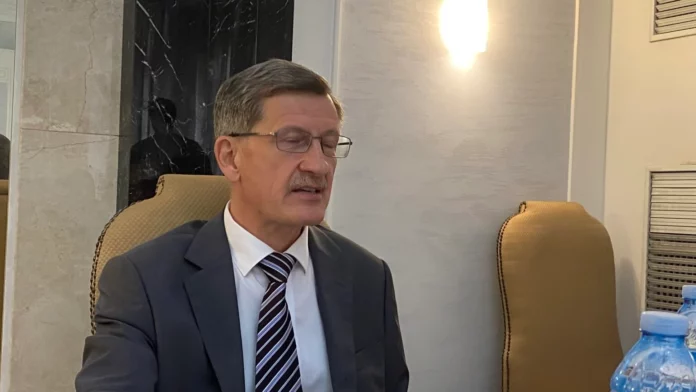The Russian government has announced plans to award at least 500,000 scholarships to international students, including thousands from Nigeria, as part of a broad strategy to strengthen educational and economic ties with Africa.
The Russian Ambassador to Nigeria, Ambassador Andrey Podelyshev, made the disclosure on Monday night during a press briefing in Abuja ahead of the upcoming Russia Day celebrations on June 12.
Ambassador Podelyshev said that the initiative is part of President Vladimir Putin’s long-term goal to increase the number of international students studying in Russia to 500,000. Currently, there are about 32,000 African students enrolled across Russian universities, with approximately 2,000 from Nigeria.
The ambassador explained that Russia is gradually raising the number of scholarships available to Nigerian students each year. For the 2025 academic year, 220 scholarships have been approved specifically for Nigerian students, and preparations are already underway for these students to begin their studies in September 2025.
These scholarships cover not only tuition fees but also living expenses. However, travel costs for the students will be the responsibility of the Nigerian government or the students themselves, according to Ambassador Podelyshev.
This ambitious scholarship programme is aimed at building strong links between Russia and Nigeria, especially in critical sectors like nuclear energy, industrial development, and infrastructure projects.
“If Russia is involved in rebuilding a plant in Ajaokuta Steel Company or establishing nuclear power plants in Nigeria, we will need Nigerian experts trained in Russia to carry out these projects,” the ambassador said.
He highlighted that the scholarships are not just educational opportunities but strategic investments to develop skilled professionals who will support major economic projects when they return home.
The Nigerian government has been working with Russia on several industrial and energy ventures, including the revitalisation of the Ajaokuta Steel Plant, which has faced decades of delays but is key to Nigeria’s industrialisation efforts. Russia has also expressed interest in supporting Nigeria’s nuclear energy ambitions as part of diversifying its energy mix.
Ambassador Podelyshev noted that Russia intends to link education closely with these large bilateral projects through the Intergovernmental Commission on Economic, Scientific and Technical Cooperation.
One major concern with international scholarships is the risk of brain drain—where students who study abroad choose to remain overseas rather than return to their home countries.
To address this, the Russian government is developing a strategic framework to encourage Nigerian students to return home after their studies.
“If students know that their education is designed to equip them for specific national projects back home, they will have a stronger reason to return and contribute to Nigeria’s development,” the ambassador explained.
This approach aims to create a pipeline of highly trained professionals ready to lead key industries in Nigeria, helping to close skills gaps and drive economic growth.
The scholarship initiative reflects a broader push by Russia to deepen educational and diplomatic ties with African countries, including Nigeria.
By increasing the number of African students in Russia, Moscow hopes to strengthen people-to-people connections, enhance cultural understanding, and build goodwill between the nations.
Nigerian students who study in Russia often pursue degrees in fields like engineering, medicine, technology, and natural sciences—areas critical to Nigeria’s development goals.
The scholarships offered are part of Russia’s commitment to support Africa’s human capital development and foster long-term cooperation.
Nigeria and Russia have a history of cooperation dating back to the Cold War era, with educational exchanges playing a key role. Thousands of Nigerians have studied in Russian universities over the decades, many returning to contribute to Nigeria’s public and private sectors.
In recent years, Russia has sought to revitalise its relationship with Nigeria through new economic agreements, investments, and technical cooperation.
The new scholarship programme is a sign of Moscow’s renewed interest in strengthening ties with Nigeria at multiple levels.
Nigeria faces significant challenges in education and skills development. Many sectors, including energy, manufacturing, and technology, require highly skilled workers to meet the demands of a growing population and economy.
Scholarship programmes like this can help close Nigeria’s skills gap by providing opportunities for students to gain advanced training abroad.
The partnership also supports Nigeria’s industrialisation agenda, including plans to revive key infrastructure projects like the Ajaokuta Steel Plant and develop new power sources.
With over 200 Nigerian students set to begin studying in Russia in 2025 alone, this initiative offers hope for more Nigerians to acquire world-class education and return home ready to contribute to national growth.
